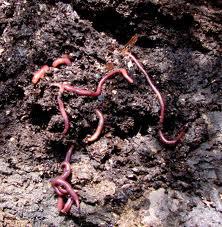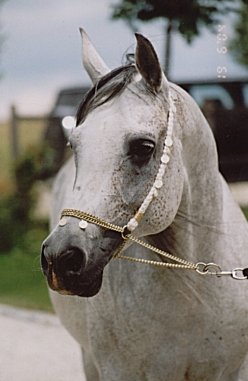Why is it important to deworm your horse on a regular schedule?
 Deworming your horse on a regular, consistent basis helps to keep him from developing dangerous parasite infestations. A severe parasite load can cause permanent internal organ damage. Horses who are infested with worms often display a poor hair coat, distended barrel, itchy tail, colic symptoms and poor overall condition; however some horses can look normal and healthy while still being in dire need of proper deworming.
Deworming your horse on a regular, consistent basis helps to keep him from developing dangerous parasite infestations. A severe parasite load can cause permanent internal organ damage. Horses who are infested with worms often display a poor hair coat, distended barrel, itchy tail, colic symptoms and poor overall condition; however some horses can look normal and healthy while still being in dire need of proper deworming.
Horses can be continually infected with parasites through contact with manure, other horses, bot flies, and even old pastures that once had infested horses grazing it. It is therefore important to keep your horse on a regular schedule.
What types of dewormer are available?
There are many different brands of dewormer currently available on the market. All of these brands can be categorized by their active ingredient:
Ivermectin based: Brands such as Bimectin, Equimectrin, Eqvalan and Zimecterin all fall into this category.
Pyrantel Pamoate based: Brands such as Strongid P, Exodus, and Exodus Multi-Dose fall into this category. Double dosing with pyrantel pamoate is often used to target tapeworm.
Moxidectin based: Brands such as Quest fall into this category. Moxidectin based dewormers are considered "fast kill" dewormers and therefore should not be administered to horses/ponies that are believed to have a large parasite load. They also have a lower safety margin than all other dewormers, therefore the dosage must be more exact.
Fenbendazole based: Brands such as Panacur and SafeGuard fall into this category.
Praziquantel based: Brands such as Equimax, Zimecterin Gold and Quest Plus fall into this category. (Praziquantel based dewormers are mixed with either an ivermectin or moxidectin based dewormer, to create a dewormer that targets tapeworms as well as the other worms normally killed by ivermectin/moxidectin based dewormers all in a single tube.) What type of dewormer should I use for my horse?
Different deworming programs are required for horses at different stages of their lives. For example, foals require deworming more often than older horses because they haven't built up any resistance to parasites yet. For this reason, it is recommended that you contact your veterinarian to help decide what type of program is appropriate for your horse. Your veterinarian can also perform a fecal egg count, which is a test that will give you an idea of the number of parasite eggs present in your horse's manure and will help you to determine what dewormer is appropriate for your horse.
However, an excellent deworming program for a healthy, active, adult horse would be deworming on a bimonthly basis with an ivermectin based dewormer, and rotating once per year with either a pyrantel pamoate based or a praziquantel/ivermectin based dewormer.
Unfamiliar horses brought to your farm or stable should be immediately dewormed with ivermectin, then dosed again in ten days, before being put on the stable's deworming program. However, if you believe that your horse has a high parasite load, it has been veterinarian recommended that you should split and distribute a normal dose of ivermectin over three days. Should I rotate the brand of dewormer I use on a regular basis?
Rotating the brand of the dewormer you use is not nearly as important as rotating the active ingredient of the dewormer you use. Parasites that are continually exposed to the same active ingredient may actually become resistant, making that particular type of dewormer ineffective for your horse(s). Horsedewormers.ca recommends rotating the active ingredient of the dewormer you use at least once annually, or as recommended by your veterinarian, as this will expose the parasites to a different chemical group with a different mode of action.
What type(s) of parasites are targeted by each dewormer?
The type(s) of parasites targeted by each dewormer depend on it's active ingredient.
Ivermectin based: target large strongyles, small strongyles, pinworms, ascarids, hairworms, large-mouth stomach worms, bots, lungworms, and intestinal threadworms.
Pyrantel pamoate based: target large strongyles, small strongyles, pinworms, ascarids, and tapeworms when double-dosed.
Moxidectin based: target large strongyles, small strongyles, pinworms, ascarids, encysted cyanthostomes, hairworms, large-mouth stomach worms, and bots.
Fenbendazole based: target large strongyles, encysted early- and late-third-stage and fourth-stage cyathostome larvae, small strongyles, pinworms, and ascarids.
Praziquantel based: target tapeworms.
What else can I do to reduce my horse's exposure to parasites?
A program created on the basis of good horse management can be used in addition to regular deworming to help reduce your horse's parasite load. However, regular deworming is still required to keep your horse healthy.
Keep your horse's turnout areas clean by picking up manure several times per week.
If hay is fed on the ground, keep this area clean and free from manure
Try to prevent overgrazing of pastures
Regularly rotate pasture areas, allowing each pasture to have a "break" from grazing
If possible, regularly rotate pastures, allowing other animals such as sheep or cattle to graze, which will interrupt the life cycle of equine parasites
Keep all horses at the same facility on the same deworming program
Make sure you accurately assess your horse's weight with a weight tape before you deworm, so that you make sure he/she is getting the appropriate amount of dewormer
These are just a few aspects of good facility/horse management that are proven to reduce the parasite burden on your horse.
 Deworming your horse on a regular, consistent basis helps to keep him from developing dangerous parasite infestations. A severe parasite load can cause permanent internal organ damage. Horses who are infested with worms often display a poor hair coat, distended barrel, itchy tail, colic symptoms and poor overall condition; however some horses can look normal and healthy while still being in dire need of proper deworming.
Deworming your horse on a regular, consistent basis helps to keep him from developing dangerous parasite infestations. A severe parasite load can cause permanent internal organ damage. Horses who are infested with worms often display a poor hair coat, distended barrel, itchy tail, colic symptoms and poor overall condition; however some horses can look normal and healthy while still being in dire need of proper deworming.
Horses can be continually infected with parasites through contact with manure, other horses, bot flies, and even old pastures that once had infested horses grazing it. It is therefore important to keep your horse on a regular schedule.
What types of dewormer are available?
There are many different brands of dewormer currently available on the market. All of these brands can be categorized by their active ingredient:
Ivermectin based: Brands such as Bimectin, Equimectrin, Eqvalan and Zimecterin all fall into this category.
Pyrantel Pamoate based: Brands such as Strongid P, Exodus, and Exodus Multi-Dose fall into this category. Double dosing with pyrantel pamoate is often used to target tapeworm.
Moxidectin based: Brands such as Quest fall into this category. Moxidectin based dewormers are considered "fast kill" dewormers and therefore should not be administered to horses/ponies that are believed to have a large parasite load. They also have a lower safety margin than all other dewormers, therefore the dosage must be more exact.
Fenbendazole based: Brands such as Panacur and SafeGuard fall into this category.
Praziquantel based: Brands such as Equimax, Zimecterin Gold and Quest Plus fall into this category. (Praziquantel based dewormers are mixed with either an ivermectin or moxidectin based dewormer, to create a dewormer that targets tapeworms as well as the other worms normally killed by ivermectin/moxidectin based dewormers all in a single tube.) What type of dewormer should I use for my horse?
Different deworming programs are required for horses at different stages of their lives. For example, foals require deworming more often than older horses because they haven't built up any resistance to parasites yet. For this reason, it is recommended that you contact your veterinarian to help decide what type of program is appropriate for your horse. Your veterinarian can also perform a fecal egg count, which is a test that will give you an idea of the number of parasite eggs present in your horse's manure and will help you to determine what dewormer is appropriate for your horse.
However, an excellent deworming program for a healthy, active, adult horse would be deworming on a bimonthly basis with an ivermectin based dewormer, and rotating once per year with either a pyrantel pamoate based or a praziquantel/ivermectin based dewormer.
Unfamiliar horses brought to your farm or stable should be immediately dewormed with ivermectin, then dosed again in ten days, before being put on the stable's deworming program. However, if you believe that your horse has a high parasite load, it has been veterinarian recommended that you should split and distribute a normal dose of ivermectin over three days. Should I rotate the brand of dewormer I use on a regular basis?
Rotating the brand of the dewormer you use is not nearly as important as rotating the active ingredient of the dewormer you use. Parasites that are continually exposed to the same active ingredient may actually become resistant, making that particular type of dewormer ineffective for your horse(s). Horsedewormers.ca recommends rotating the active ingredient of the dewormer you use at least once annually, or as recommended by your veterinarian, as this will expose the parasites to a different chemical group with a different mode of action.
What type(s) of parasites are targeted by each dewormer?
The type(s) of parasites targeted by each dewormer depend on it's active ingredient.
Ivermectin based: target large strongyles, small strongyles, pinworms, ascarids, hairworms, large-mouth stomach worms, bots, lungworms, and intestinal threadworms.
Pyrantel pamoate based: target large strongyles, small strongyles, pinworms, ascarids, and tapeworms when double-dosed.
Moxidectin based: target large strongyles, small strongyles, pinworms, ascarids, encysted cyanthostomes, hairworms, large-mouth stomach worms, and bots.
Fenbendazole based: target large strongyles, encysted early- and late-third-stage and fourth-stage cyathostome larvae, small strongyles, pinworms, and ascarids.
Praziquantel based: target tapeworms.
What else can I do to reduce my horse's exposure to parasites?
A program created on the basis of good horse management can be used in addition to regular deworming to help reduce your horse's parasite load. However, regular deworming is still required to keep your horse healthy.
Keep your horse's turnout areas clean by picking up manure several times per week.
If hay is fed on the ground, keep this area clean and free from manure
Try to prevent overgrazing of pastures
Regularly rotate pasture areas, allowing each pasture to have a "break" from grazing
If possible, regularly rotate pastures, allowing other animals such as sheep or cattle to graze, which will interrupt the life cycle of equine parasites
Keep all horses at the same facility on the same deworming program
Make sure you accurately assess your horse's weight with a weight tape before you deworm, so that you make sure he/she is getting the appropriate amount of dewormer
These are just a few aspects of good facility/horse management that are proven to reduce the parasite burden on your horse.











